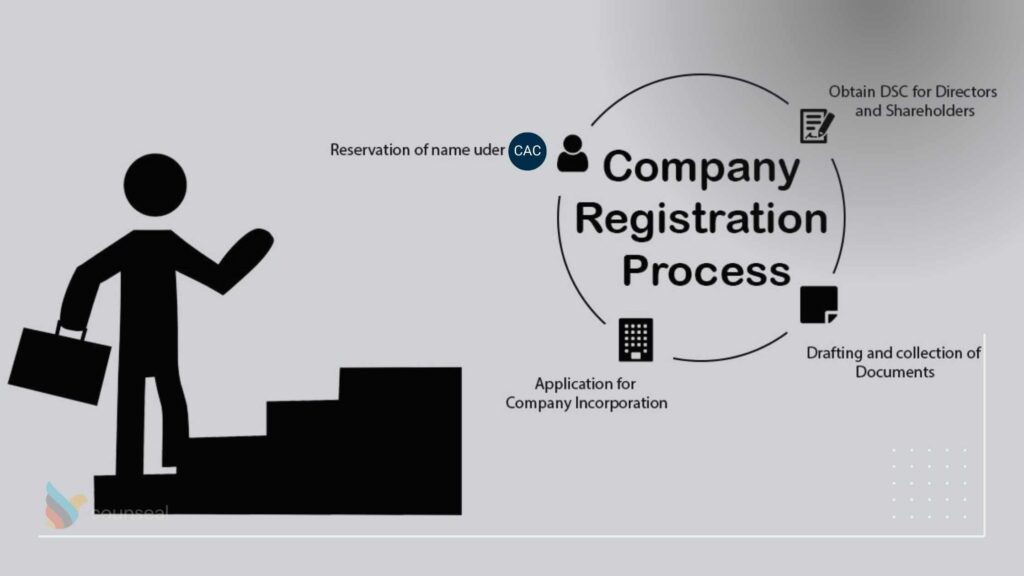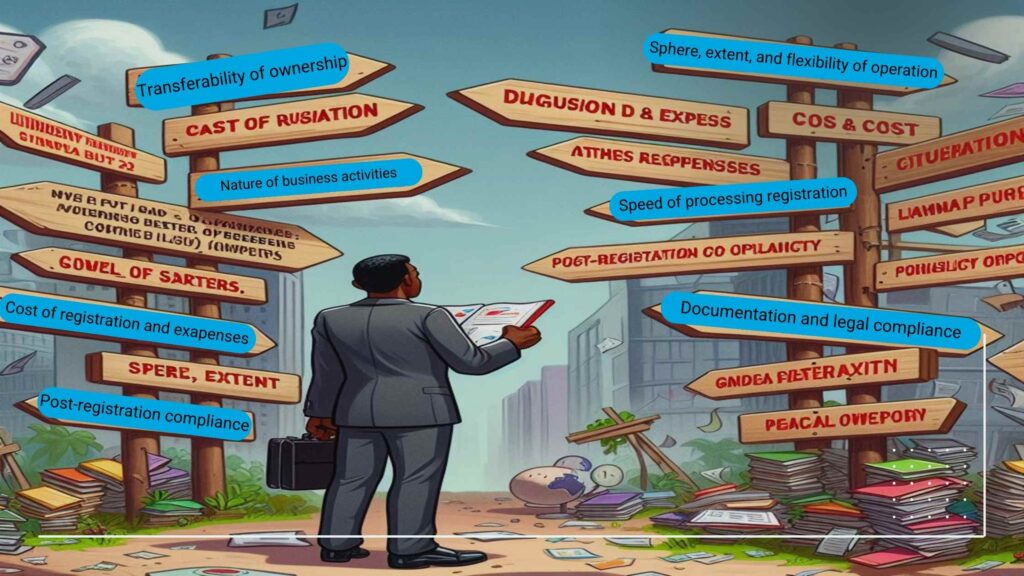Understanding the Cost of Business Registration in Nigeria

by Counseal Team
Updated April 2, 2024

Jumping into the world of entrepreneurship is thrilling, but it also involves a fair share of paperwork. One crucial aspect that you cannot afford to overlook for your Nigerian business is registration.
Let me share a few insights on why registering your business is essential and how to navigate the costs involved.
- Why Your Business Needs to Be Registered in Nigeria
- What is Business Registration?
- Types of Business Entities in Nigeria
- The Cost Factors: Unravelling the True Cost of Business Registration in Nigeria
- Step-by-Step Registration Procedure
- Post-Registration Obligations You Can't Ignore
- Budgeting for Registration
- Final Thoughts
- Frequently Asked Questions
Why Your Business Needs to Be Registered in Nigeria
The Legitimacy Factor
First, registering your business provides legitimacy. A registered business is like a stamp of trust in the eyes of customers, investors, and partners. It shows that you’re serious about your venture and are willing to comply with the legal requirements. Being registered also shields you from potential legal issues, something every entrepreneur would want to avoid.
Access to Funding and Support
Registering your business opens doors to funding opportunities. Most financial institutions and investors won’t even consider you if your business isn’t registered. They need assurance that their investment is going into a legitimate operation. Plus, registered businesses can tap into government incentives and support that can give your venture a much-needed boost.
Better Business Relationships
Partners and suppliers tend to prefer dealing with registered businesses. It’s a matter of trust. Registration assures them that you’re not just another fly-by-night operator but someone who’s here for the long haul.
Protecting Your Brand
Lastly, registering your business helps protect your brand name. By registering, you’re essentially staking your claim on the name and preventing others from using it.
The bottom line is that registering your business in Nigeria is an investment that pays off in manifold ways. It brings legitimacy, opens avenues for funding, facilitates better business relationships, and safeguards your brand. So, if you’re an entrepreneur ready to take the plunge, make sure business registration tops your to-do list.
What is Business Registration?
Business registration is the process of officially and legally establishing a business entity within the confines of the law. It involves providing necessary details about your business to the Corporate Affairs Commission (CAC), including:
- Business name
- Nature of business
- Ownership details
Once registered, your business is recognised by law and can operate legally in Nigeria. Operating an unregistered business is considered illegal and can lead to legal troubles.
But beyond compliance, business registration offers several key benefits:
- Legal Protection: Your registered business name is protected by law, preventing others from using the same or a similar name.
- Access to Benefits: Registered businesses can access government subsidies, grants, loans, and enter into formal contracts.
- Reputation and Credibility: A registered business commands more trust from customers, suppliers, and investors. It signals professionalism and commitment.
- Expansion Opportunities: Registered businesses have the legal standing to open branches, recruit employees, and attract foreign investments.
In essence, business registration in Nigeria, while it may seem daunting, is a worthwhile investment. It’s the first step in building a successful enterprise.
Types of Business Entities in Nigeria
Nigeria offers several types of business entities, each with its own characteristics, benefits, and drawbacks. Let’s take a quick look at the main ones:
Sole Proprietorship
A sole proprietorship is the simplest form of business entity. It’s quick to set up and involves minimal paperwork. However, as the sole owner, you’re personally liable for all business debts and obligations.
Partnerships
Partnerships involve two or more people sharing ownership, profits, and losses of a business. It’s relatively easy to set up and allows for pooling of resources. However, partners are jointly liable for business debts.
Limited Liability Company (LLC)
An LLC offers the benefits of limited liability protection (your personal assets are protected in case of business debts) and the tax advantages of a partnership. However, setting up an LLC involves more paperwork and formalities.
Public Limited Company (PLC)
A PLC is a more complex business structure that allows for public ownership through the issuance of shares. It offers limited liability and the ability to raise substantial capital. However, it’s more heavily regulated and involves extensive reporting and compliance requirements.
Non-Profit Organisations
Non-profit organisations, such as Incorporated Trustees or Companies Limited by Guarantee, are set up for charitable, educational, or social purposes. They’re exempt from certain taxes but also face strict regulations on how funds can be used.

Choosing the right business entity depends on various factors such as the nature of your business, your growth plans, and your risk tolerance. It’s advisable to seek professional advice to make an informed decision.
The Cost Factors: Unravelling the True Cost of Business Registration in Nigeria
Now that we understand the importance and types of business registration, let’s dive into the costs involved. The cost of registering a business in Nigeria can be broken down into three main categories:
Government Fees: Understanding the Official Costs
Government fees vary based on the type of business entity and the share capital. For example:
- Limited Liability Company: Name reservation costs ₦500, while registration fees range from ₦10,000 to ₦15,000 depending on share capital.
- Business Name: Name reservation and registration cost ₦10,000.
- Incorporated Trustee (NGO): Name reservation costs ₦20,000 and registration costs ₦30,000.
These are just the official fees. There are other costs to consider.
Professional Fees: Ensuring Compliance and Avoiding Pitfalls
While it’s possible to handle the registration process yourself, it’s advisable to engage professionals (lawyers, accountants) to ensure compliance and avoid costly mistakes. Professional fees can range from:
- Legal Services: ₦50,000 to ₦150,000 depending on business complexity.
- Accounting Services: ₦30,000 to ₦100,000.
These fees can seem steep, but they’re a worthwhile investment to ensure a smooth and compliant registration process.
Miscellaneous Costs: Accounting for the Unexpected
There are also some miscellaneous costs to factor in, such as:
- Stamp Duty: 0.75% of share capital for Limited Liability Companies.
- Notary Fees: Around ₦7,000.
- Administrative Costs: Transportation, printing, etc.
To give you a rough idea, registering a Limited Liability Company with a share capital of ₦1 million could cost between ₦150,000 to ₦300,000 when you factor in all the costs.

Remember, these are estimates and your actual costs may vary. But by being aware of these costs, you can better plan and budget for your business registration.
Step-by-Step Registration Procedure
Now that we’ve covered the why and the how much, let’s delve into the actual process of registering your business in Nigeria.
Pre-Registration Requirements
Before you start the registration process, ensure you have the following in order:
- Business Name: Choose a unique and appropriate name for your business.
- Identification: Have a valid means of identification (National ID card, International Passport, Driver’s License, or Voter’s ID card).
- Passport Photographs: Have recent passport photographs of yourself and other directors/partners.
- Directors’ Details: Full names, addresses and occupations of directors/partners.
- Business Address: A physical office address (P.O. Box not accepted).
Having these documents and information ready will make the registration process smoother.
The Registration Procedure
With your documents in hand, follow these steps to register your business:
- Name Availability Search: Check if your proposed business name is available on the CAC portal.
- Reserve a Name: If the name is available, reserve it. This takes about 2-3 working days.
- Complete Pre-Registration Form: Fill out Form CAC1.1 on the CAC portal.
- Pay Registration Fees: Pay the applicable registration fees.
- Prepare Necessary Documents: Prepare and upload the required documents on the CAC portal.
- Submit Documents: Submit the documents to the CAC office.
- Collect Certificate of Incorporation: Once your documents are approved, you’ll be notified to collect your Certificate of Incorporation.

Case Study: Lola’s Successful Registration
Let’s look at an example of successful business registration. Lola, a fashion entrepreneur, followed these steps to register her business, ‘Lola’s Fabrics’:
- Conducted a name search and reserved ‘Lola’s Fabrics’.
- Filled out the pre-registration form.
- Paid the registration fees.
- Prepared and submitted necessary documents.
- Received her Certificate of Incorporation within a week.
Lola’s experience shows that with the right preparation and guidance, registering a business in Nigeria can be a smooth process.
Post-Registration Obligations You Can’t Ignore
Congratulations on registering your business! But the work doesn’t stop there. There are several post-registration obligations you must fulfill to stay compliant and avoid penalties.
Taxation and Compliance: Playing by the Rules
As a registered business in Nigeria, you have certain tax obligations, including:
- Company Income Tax: A tax on your business profits.
- Value Added Tax (VAT): A tax on goods and services.
- Withholding Tax: A tax deducted at source on certain transactions.
Complying with your tax obligations not only keeps you in good standing with the Federal Inland Revenue Service (FIRS) but also contributes to the nation’s development.

Annual Returns and Renewals: Keeping Your Business in Good Health
Think of annual returns as an annual health check for your business. Every registered company in Nigeria must file annual returns with the CAC within 60 days of the anniversary of incorporation. This includes:
- Financial Statements: A detailed record of your business’s financial performance.
- Directors’ Report: A report on the state of affairs of the company.
- Auditor’s Report: An independent assessment of your financial statements.
Filing annual returns not only keeps you compliant but also provides an opportunity to assess your business’s performance and make necessary adjustments.
The cost of filing annual returns depends on your company’s share capital but consider it a small price to pay for keeping your business in good standing.
Case Study: Lola’s Fabrics Compliance Journey
Let’s look at how Lola’s Fabrics, a medium-sized manufacturing company, manages its post-registration obligations:
- Taxation: Lola’s Fabrics engages a tax consultant to ensure timely and accurate filing of its tax returns.
- Annual Returns: The company designates a compliance officer to compile and file its annual returns with the CAC.
- Renewals: Lola’s Fabrics maintains a calendar of all necessary permit and license renewals to avoid lapses.
By staying on top of its post-registration obligations, Lola’s Fabrics has maintained a clean compliance record, which has helped in attracting investors and clients.
Budgeting for Registration
Now that we’ve covered the registration process and post-registration obligations, let’s talk about budgeting for the costs involved.
Understanding Business Registration Costs
The costs of registering a business in Nigeria can be broken down into:
- Official Fees: Payable to the CAC for name reservation, filing, etc.
- Professional Fees: For legal and accounting services.
- Miscellaneous Costs: Stamp duty, notary fees, administrative expenses, etc.
While the official fees are fixed, professional and miscellaneous costs can vary depending on the complexity of your business and the level of support you require.
Practical Tips for Managing Expenses
Here are some tips to help you manage your registration expenses:
- Create a Budget: List out all expected costs and allocate funds accordingly.
- Shop Around: Compare quotes from different professional service providers.
- Use Online Platforms: The CAC online portal can help reduce costs and time spent on registration.
- Do It Yourself: If you have the know-how, you can handle certain aspects of the registration yourself.
- Plan for Contingencies: Set aside some extra funds for unexpected costs.
Remember, the goal is to maximize value from your registration expenses. Consider them an investment in the legal foundation of your business.
Case Studies: Balancing Cost and Value
Let’s look at how two businesses approached their registration expenses:
- Tech Startup: Spent ₦50,000 on registration, including fees for name reservation, filing, and legal assistance. They viewed it as a necessary cost for establishing credibility with investors.
- Retail Store: Kept registration costs at ₦20,000 by using the CAC portal and handling most of the process themselves. They prioritized cost savings to allocate more funds to inventory.
These examples show that there’s no one-size-fits-all approach to registration expenses. It’s about balancing your business’s needs and resources.
Final Thoughts
Registering a business in Nigeria is a crucial step in your entrepreneurial journey. While it involves costs and compliance obligations, the benefits of legitimacy, access to funding, legal protection, and credibility are immense.
By understanding the registration process, post-registration obligations, and associated costs, you can make informed decisions and plan effectively. Remember, the cost of registration is an investment in the future of your business.
As you navigate the world of business in Nigeria, keep learning, stay compliant, and never hesitate to seek professional advice when needed. Here’s to your success!
Frequently Asked Questions
What are the basic costs involved in registering a business in Nigeria?
The basic costs include filing fees, stamp duty, and professional fees for legal and accounting services. The exact amount varies based on the business type and services required.
How much does it cost to register a sole proprietorship in Nigeria?
Registering a sole proprietorship typically costs between ₦10,000 to ₦15,000, excluding professional fees.
What are the additional costs that might arise during the business registration process?
Additional costs can include notary fees, business permit fees, and administrative expenses like transportation or postage.
Can I register my business online, and does it reduce the cost?
Yes, you can register your business online via the Corporate Affairs Commission’s portal, which can save on transportation and time costs.
What is the cost of registering a limited liability company in Nigeria?
Registering a limited liability company starts from around ₦50,000 upwards, depending on share capital and professional fees.
Are there any recurring costs after registering my business?
Yes, recurring costs include annual returns filing, tax filings, and business permit renewals necessary for staying compliant.
How can I minimize the costs of business registration in Nigeria?
To minimize costs, understand all required fees, compare service providers, and consider handling some steps yourself if you have the expertise. Proper planning can also help avoid unexpected expenses.




